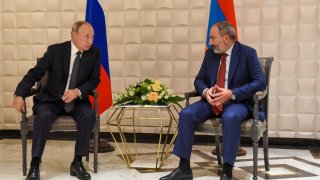Russia Will Never Accept an Armenian Withdrawal
Europe's tempting of Armenia toward integration with Europe could end in disaster for Yerevan.
For strategic reasons, Russia has openly or tacitly supported separatist or Eurosceptic movements in Europe (whether the United Kingdom’s “Brexit” from the EU, Scottish independence, or Catalan separatism) to weaken the unity of its rivals. Of course, for the same reasons, it does not accept similar withdrawals of its neighbors, the former Soviet republics, from Russia’s Eurasian sphere of influence and the multilateral organizations that bind it together. Presidents Boris Yeltsin and Vladimir Putin both manufactured and sustained conflicts to maintain their influence in Moldova, Georgia, and Ukraine and prevent them from joining the West.
Armenian prime minister Nikol Pashinyan has announced that he supports European integration. “Many new opportunities are largely being discussed in Armenia nowadays and it will not be a secret if I say that includes membership in the European Union,” Armenia’s Minister of Foreign Affairs Ararat Mirzoyan said. To join the EU would require an “Armexit” from the Russian-led Eurasian Economic Union (EEU), as no country can belong to two customs unions.
Pashinyan has not been critical of the EEU, unlike his condemnations of the Russian-led CSTO (Collective Security Treaty Organisation), from which he is also threatening to withdraw. Pashinyan has made no mention of replacing the CSTO with an aspiration to join NATO. Nevertheless, the Kremlin no longer views the EU and NATO as separate entities. Russian officials and media have strongly condemned the European Union mission in Armenia, which was established in January 2023, seeing it as the thin edge of the country moving into the EU, thereby establishing a de facto security relationship with Europe and the United States. Russian foreign minister Sergei Lavrov claimed the EU mission in Armenia is “turning into a NATO mission.”
The Kremlin warned Armenia that it could not survive without Russia. RT (formerly Russia Today) head Margarita Simonyan, who is herself Armenian but a fervent Putin supporter, accused Pashinyan of betraying Armenia “for a meager pension.”
Russia controls Armenia’s energy sector. 850,000 Armenians live as migrant laborers in Russia, almost a third of the population of Armenia. Their large remittances are a significant contribution to the country’s economy.
Since Pashinyan came to power in a color revolution in 2018, he has talked up European integration while increasing economic cooperation and trade with Russia. Armenian-Russian trade is growing, not declining. Armenia is a major re-exporter of Western goods to Russia, breaking sanctions imposed by the West in the aftermath of the invasion of Ukraine. To prevent the United States from imposing sanctions against Armenia, the Armenian Central Bank has banned Armenian banks from using the Russian “Mir” national repayment system.
Pashinyan blames Russia for not militarily intervening in support of Armenia during the 2020 Second Karabakh War with Azerbaijan. Pashinyan also condemned Russia’s so-called “peacekeepers” for not protecting the Karabakh separatist enclave in 2023.
Pashinyan has frozen Armenia’s CSTO membership and is no longer contributing to its budget. Armenian officials have also raised the possibility of Armenia withdrawing from the CSTO, drawing a barrage of Russian threats.
Pashinyan has demanded Russia withdraw Russian border guards from Zvartnots International Airport in Yerevan and its international borders. Armenia is considering whether to ask Russia to close its military base in Gyumri, which would be far more provocative. The base resulted from a 1995 agreement between Moscow and Yerevan and was renewed by a 2010 protocol, extending the lease until 2044. Pashinyan would have immense difficulty unilaterally closing the Russian military base.
Relations with Russia are a domestic football. Military defeat has eroded the support base of the opposition from the so-called “Karabakh clan” who ran Armenia for most of its independence since 1991. The Kremlin would ideally like to replace Pashinyan with a pro-Russian regime like what existed prior to 2018. Russia supports the pro-Russian Armenian Apostolic Church, whose Archbishop Bagrat Galstanyan calls for Pashinyan’s resignation. Russia’s media, which continues to have a large audience in Armenia, has supported the demands for Pashinyan’s ouster, blaming him for Armenia’s military defeats in 2020 and 2023.
The Kremlin was always suspicious of color revolutions, believing them to be CIA-orchestrated conspiracies against Russia. Consequently, Russian media have spread conspiratorial claims that Pashinyan was brought to power by “globalist” forces and has since then “obediently implement[ed] their programs.” Armenia was allegedly being dragged into the EU by masonic lodges, which are “the real master of the entire European Union.” On March 24, Armenia blocked two TV shows by Kremlin propagandist Vladimir Solovyov and ended the agreement to re-transmit Russian television broadcasts to Armenia the following month.
Pashinyan said it had been a mistake for Armenia to rely solely on Russia since 1991. Foreign Minister Sergei Lavrov responded by saying Russia would be forced to revise its relations with Armenia as it is aligning with “Russia’s enemies.” Pashinyan did not attend Putin’s May 7 inauguration. In turn, Lavrov accused Armenian leaders of defaming Russian border guards, Russian military personnel at its base in Gyumri, and the CSTO.
Pashinyan’s rhetoric on European integration will not lead to anything concrete because a hyper-nationalistic and imperialistic Kremlin will never allow an Armexit. The West is foolishly encouraging Armenia’s withdrawal while ignoring the possible severity of Russia’s response. As seen in Ukraine, Putin will fight long and hard to keep his neighbors from asserting their independence from Russian control.
Taras Kuzio is a Professor of Political Science at the National University of Kyiv Mohyla Academy and author of Fascism and Genocide: Russia’s War Against Ukrainians (Columbia University Press, 2023).
Image: Asatur Yesayants / Shutterstock.com.

